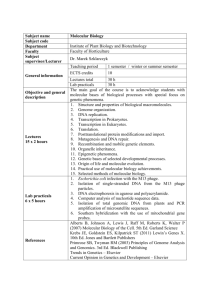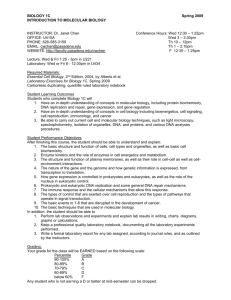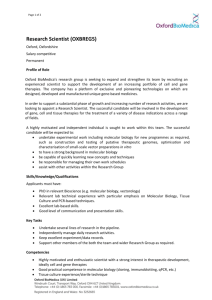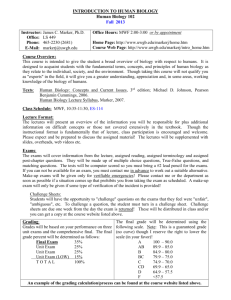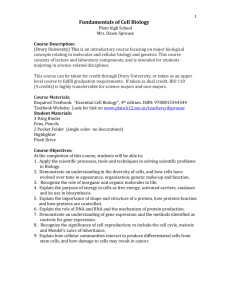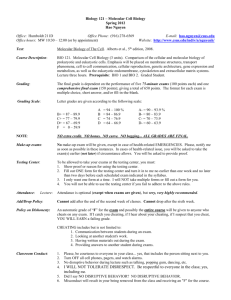PRINCIPLES OF GENETICS - East Carolina University
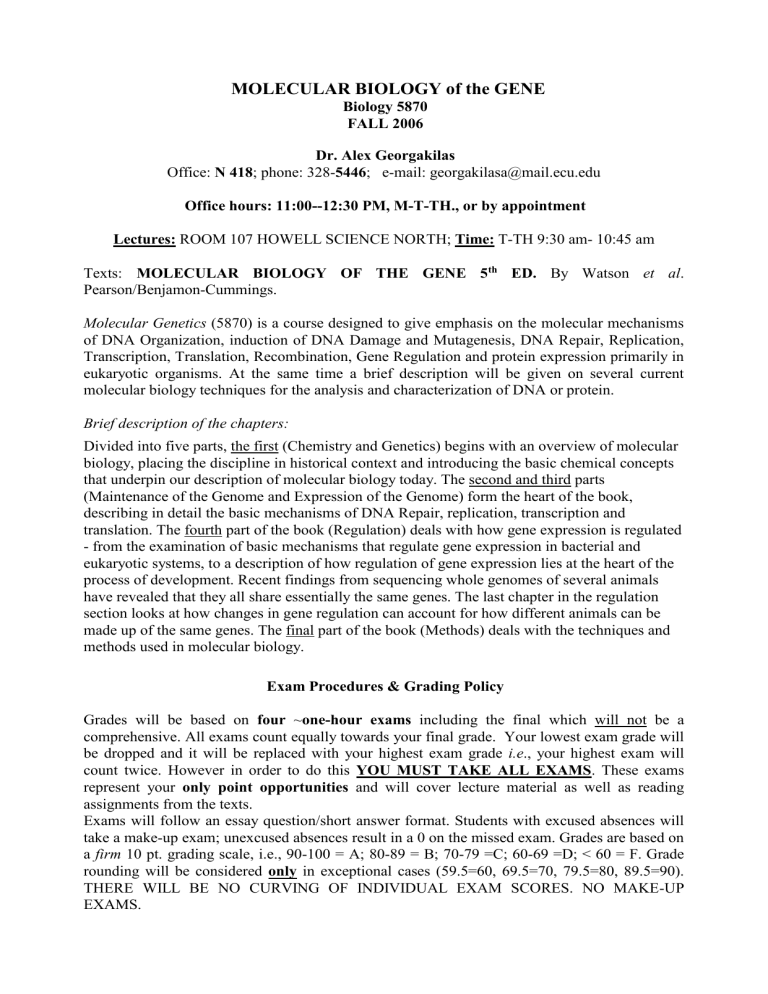
MOLECULAR BIOLOGY of the GENE
Biology 5870
FALL 2006
Dr. Alex Georgakilas
Office: N 418 ; phone: 3285446 ; e-mail: georgakilasa@mail.ecu.edu
Office hours: 11:00--12:30 PM, M-T-TH., or by appointment
Lectures: ROOM 107 HOWELL SCIENCE NORTH; Time: T-TH 9:30 am- 10:45 am
Texts: MOLECULAR BIOLOGY OF THE GENE 5 th ED. By Watson et al .
Pearson/Benjamon-Cummings.
Molecular Genetics (5870) is a course designed to give emphasis on the molecular mechanisms of DNA Organization, induction of DNA Damage and Mutagenesis, DNA Repair, Replication,
Transcription, Translation, Recombination, Gene Regulation and protein expression primarily in eukaryotic organisms. At the same time a brief description will be given on several current molecular biology techniques for the analysis and characterization of DNA or protein.
Brief description of the chapters:
Divided into five parts, the first (Chemistry and Genetics) begins with an overview of molecular biology, placing the discipline in historical context and introducing the basic chemical concepts that underpin our description of molecular biology today. The second and third parts
(Maintenance of the Genome and Expression of the Genome) form the heart of the book, describing in detail the basic mechanisms of DNA Repair, replication, transcription and translation. The fourth part of the book (Regulation) deals with how gene expression is regulated
- from the examination of basic mechanisms that regulate gene expression in bacterial and eukaryotic systems, to a description of how regulation of gene expression lies at the heart of the process of development. Recent findings from sequencing whole genomes of several animals have revealed that they all share essentially the same genes. The last chapter in the regulation section looks at how changes in gene regulation can account for how different animals can be made up of the same genes. The final part of the book (Methods) deals with the techniques and methods used in molecular biology.
Exam Procedures & Grading Policy
Grades will be based on four ~ one-hour exams including the final which will not be a comprehensive. All exams count equally towards your final grade. Your lowest exam grade will be dropped and it will be replaced with your highest exam grade i.e
., your highest exam will count twice. However in order to do this YOU MUST TAKE ALL EXAMS . These exams represent your only point opportunities and will cover lecture material as well as reading assignments from the texts.
Exams will follow an essay question/short answer format. Students with excused absences will take a make-up exam; unexcused absences result in a 0 on the missed exam. Grades are based on a firm 10 pt. grading scale, i.e., 90-100 = A; 80-89 = B; 70-79 =C; 60-69 =D; < 60 = F. Grade rounding will be considered only in exceptional cases (59.5=60, 69.5=70, 79.5=80, 89.5=90).
THERE WILL BE NO CURVING OF INDIVIDUAL EXAM SCORES. NO MAKE-UP
EXAMS.
Study Guides & Help Sessions
Study guides, consisting of a vocabulary list, problems, & reading assignments, will be issued to aid in preparing for exams. It is to your advantage to use these along with the text while studying. The course lectures will also be listed on Blackboard. I will hold help sessions prior to each exam. The time and location of sessions will be arranged in class.
Accommodations for Students with Special Needs
East Carolina University seeks to comply fully with the Americans with Disabilities Act (ADA).
Students requesting accommodations based on a covered disability must go to the Department for Disability Services, located in Brewster A-114, to verify the disability before any accommodations can occur. The telephone number is 252-328-6799.
Academic Integrity
Every student is expected to complete all assignments and activities for this course in accordance with the Principles of Academic Integrity as outlined in the Student Handbook. Actual or attempted cheating, plagiarism, or falsification are serious violations of ECU’s honor code and will be dealt with as specified by the University (see Student Handbook for details).Please do not place yourself or the instructor in the position of having to deal with these serious issues.
Date
Aug 24
Aug 29
Aug 31
Topic
LECTURE SCHEDULE
Text
Sep 05
Sep 07
Sep 12
Sep 14
Sep 19
Sep 21
Introduction
Nucleid Acids as Carriers of Genetic Information
Ch. 1-2
Ch. 1-2
Weak and Strong Bonds Determine the DNA Structure Ch. 3-5
>>
The Structures of DNA and RNA
>>
FIRST EXAM
The Replication of DNA
>>
Organization of DNA in Chromosomes
Sep 26
Sep 28
>>
DNA Damage, Repair and Mutagenesis
Sep 29 LAST DAY TO DROP CLASSES
Oct 03 >>
Oct 05 Homologous Recombination
Oct 10
Ch. 3-5
Ch. 6
Ch. 7
Ch. 7
Ch. 8
Ch. 8
Ch. 9
Ch. 9
Ch. 10
Ch. 10
SECOND EXAM Oct 12
Oct 14-17
Oct 19
Oct 24
Oct 26
Oct 31
Nov 02
Fall Break
>>
>>
>>
THIRD EXAM
Transcription/Translation Mechanisms-Genetic Code Ch. 12-15
Ch. 12-15
Ch. 12-15
Ch. 12-15
Ch. 16-18
Ch. 16-18
Ch. 16-18
Ch. 16-18
Ch. 20
Nov 07
Nov 09
Nov 14
Nov 16
Gene Regulation-Emphasis in Eukaryotes
>>
>>
>>
Nov 21 Techniques in Molecular Biology/Applications
Nov 22-26 Thanksgiving Break
Nov 28
Nov 30
Dec 05
Dec 07
Techniques in Molecular Biology/Applications
>>
Overview of all chapters
Overview of all chapters
Dec 14 Thursday FINAL EXAM
Ch. 20
Ch. 20
I look forward to working with you this semester
